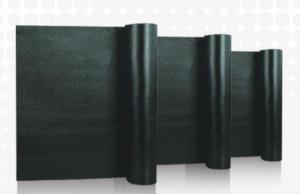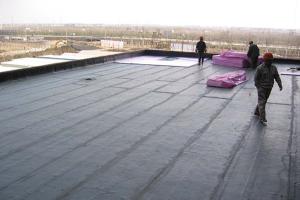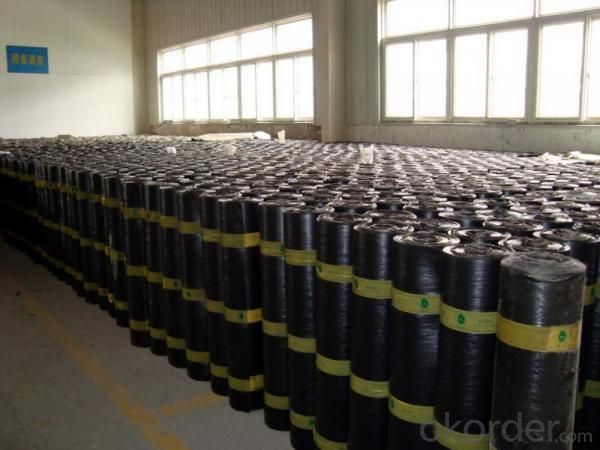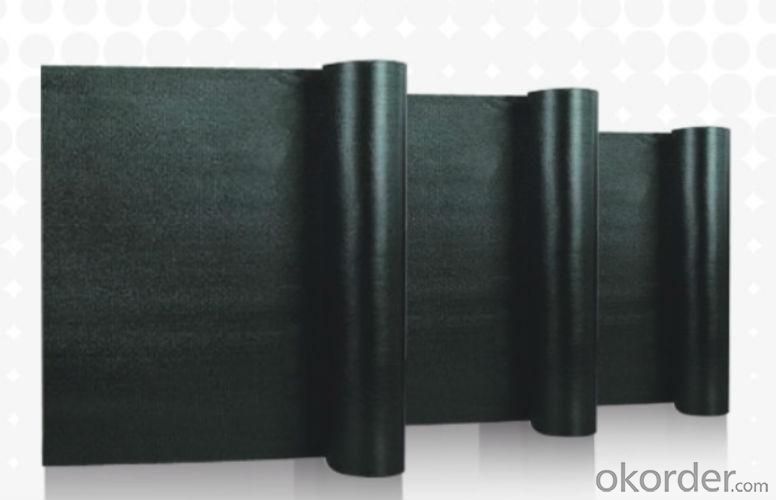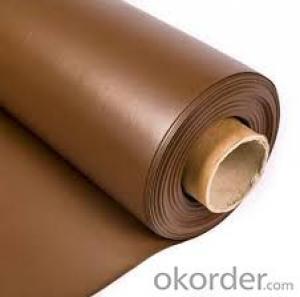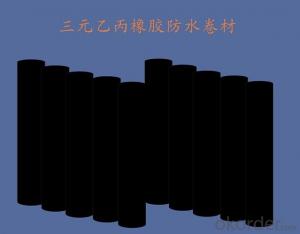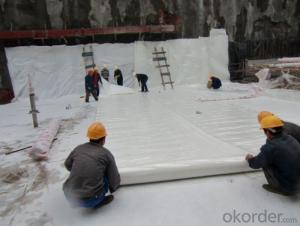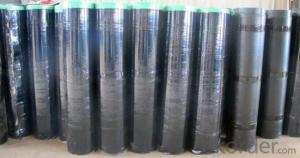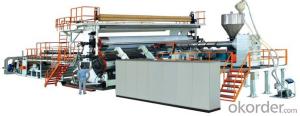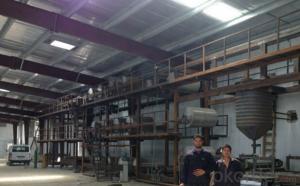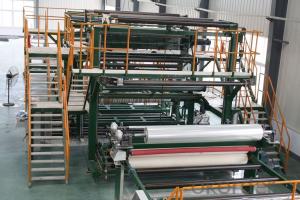APP Modified Bitumen Waterproofing Membrane
- Loading Port:
- China Main Port
- Payment Terms:
- TT or LC
- Min Order Qty:
- 2000 M2 m²
- Supply Capability:
- ONE WEEK PER CONTAINE m²/month
OKorder Service Pledge
OKorder Financial Service
You Might Also Like
APP modified bitumen waterproofing membrane is made by soaking the base in bitumen,or thermoplastics (such as atactic polypropylene-APP,APAO,APAL) modified bitumen, then covering double faces with thermoplastics( APP, APAO,APAL) modified bitumen, and last finiishing the upward face with fine sands, mineral slates(or grains) or polythene membrane ect, while downward face with fine sands or polythene membrane.
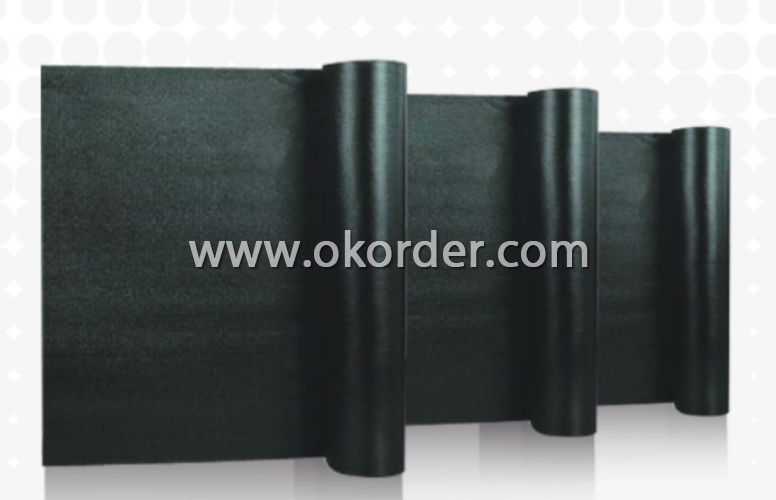
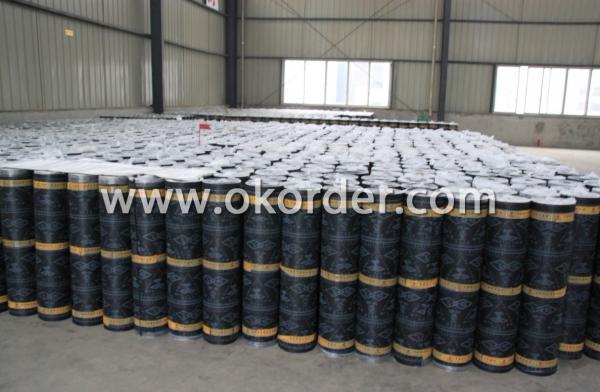
Specification of APP Polyester Waterproofing Membrane:
|
N |
ITEM |
STANDARD |
TEST RESULT |
||
|
1
|
WATER IMPERMEABILITY |
PRESSUREMpa |
>0.3 |
NO IMPERAMEABILITY |
|
|
KEEPING TIME, min |
120MIN |
||||
|
2 |
TENSION N/5cm |
≥300 |
MEET ASTM-D5147 |
||
|
3 |
FRACTURE ELONGATION,% |
≥450 |
LONGTIUDINAL550.0 TRANSVERSE 510.0 |
||
|
4 |
SOFTEN POINT |
110°C, |
MEET ASTM-D 5147 |
||
|
5 |
COLD FLEXIBILITY |
≥0(-20) |
MEET ASTM-D 5147 |
||
|
6 |
ELONGATION |
≥45 |
47 |
||
|
7 |
APP/SBS WATERPROOF MEMBRANE MEET DEMAND OF ASTM STANDARD | ||||
Usage of SBS/APP Waterproofing Membrane :
It is widely used for industry and civil building --- the waterproof and dampproof of the roofs, basements, toilets etc; and the waterproofing of bridges, parking area, tunnels, reservoir etc.
SBS modified bitumen waterproof membrane is specially suitable to the building waterproofing in cold area and to the buildings of changeable constructions while APP specially suitable to areas of high temperature and of strong sunshine.
- Q: Can a waterproofing membrane be used in steam rooms?
- Yes, a waterproofing membrane can be used in steam rooms. A waterproofing membrane is designed to prevent water infiltration and is commonly used in areas where moisture is present, such as bathrooms, showers, and steam rooms. The membrane acts as a barrier, preventing water vapor from penetrating the underlying structure and causing damage. In steam rooms, where high levels of humidity and moisture are present, using a waterproofing membrane is essential to protect the walls, floors, and other surfaces from water damage and mold growth. It is important to choose a waterproofing membrane that is specifically designed for high moisture environments like steam rooms to ensure proper protection and longevity. Additionally, proper installation and adherence to manufacturer guidelines are crucial for the effectiveness and durability of the waterproofing membrane in a steam room setting.
- Q: Can a waterproofing membrane be used in conjunction with vapor barriers?
- Yes, a waterproofing membrane can be used in conjunction with vapor barriers. In fact, it is often recommended to use both to ensure comprehensive protection against moisture. Waterproofing membranes are designed to prevent water from penetrating through a surface, such as a roof or foundation, while vapor barriers are designed to prevent the passage of water vapor. By using both, you can effectively prevent both liquid water and water vapor from causing damage to a structure. The waterproofing membrane acts as a physical barrier to prevent water from entering, while the vapor barrier prevents the buildup of moisture within the structure. This combination can be particularly beneficial in areas with high humidity or where there is a risk of water intrusion.
- Q: Can a waterproofing membrane be used on PVC roofs?
- Yes, a waterproofing membrane can be used on PVC roofs. PVC (polyvinyl chloride) roofs are commonly used in commercial and residential buildings due to their durability and resistance to weathering. However, like any roofing material, PVC roofs can develop leaks or cracks over time. Applying a waterproofing membrane can help protect the roof from water infiltration and extend its lifespan. Waterproofing membranes, such as EPDM (ethylene propylene diene terpolymer) or TPO (thermoplastic olefin), are flexible and can adhere to the PVC surface, creating a seamless and watertight barrier. It is important to ensure that the waterproofing membrane is compatible with PVC roofs and follow the manufacturer's instructions for proper installation. Regular maintenance and inspections are also recommended to identify and address any potential issues before they escalate.
- Q: Are waterproofing membranes suitable for historical preservation projects?
- Waterproofing membranes can be suitable for historical preservation projects, depending on the specific circumstances and goals of the project. Waterproofing membranes are designed to provide a protective barrier against water infiltration, which can help to prevent damage to historical structures caused by moisture. In some cases, historical buildings may have existing waterproofing systems that are deteriorated or no longer effective. In these situations, the use of modern waterproofing membranes can be a viable option to protect and preserve the structure. These membranes can be installed discreetly, without altering the original appearance or architectural integrity of the building. However, it is crucial to approach the use of waterproofing membranes in historical preservation projects with caution. The potential impact on the authenticity and historical value of the structure must be carefully evaluated. Some historical buildings may have unique construction methods or materials that require specialized preservation techniques. In such cases, alternative preservation methods that do not involve the use of membranes may be more appropriate. Additionally, it is important to consider the long-term consequences and maintenance requirements of waterproofing membranes. Some membranes may have a limited lifespan, and periodic inspections and maintenance may be necessary to ensure their continued effectiveness. This ongoing maintenance should be factored into the overall preservation plan and budget. Ultimately, the decision to use waterproofing membranes in historical preservation projects should be based on a thorough assessment of the specific needs and characteristics of the building, as well as the preservation objectives. Consulting with preservation experts, architects, and engineers can help to determine the most suitable approach for each unique project.
- Q: Can a waterproofing membrane be used on precast steel surfaces?
- Indeed, precast steel surfaces can benefit from the utilization of a waterproofing membrane. These membranes are specifically engineered to serve as a safeguard against water infiltration, making them suitable for various surfaces, including precast steel. By acting as a waterproof shield, the membrane effectively blocks water from penetrating the surface and causing any potential harm. It is imperative to ensure that the surface is adequately primed and sanitized prior to applying the membrane to ensure optimal adhesion and efficacy. Furthermore, seeking advice from a qualified waterproofing contractor is highly recommended in order to identify the most suitable membrane type and application technique for the specific precast steel surface.
- Q: Are waterproofing membranes suitable for bridge abutments?
- Yes, waterproofing membranes are suitable for bridge abutments. Bridge abutments are the structures that support the ends of a bridge, and they are typically exposed to a significant amount of moisture and water. Waterproofing membranes are designed to provide a protective barrier against water and moisture intrusion, making them an ideal solution for bridge abutments. These membranes are typically made from materials such as bitumen, PVC, or EPDM, which are highly resistant to water penetration. Additionally, waterproofing membranes can also provide protection against other factors such as UV rays, chemicals, and temperature fluctuations. By installing waterproofing membranes on bridge abutments, the risk of water damage, deterioration, and corrosion can be significantly reduced, leading to increased durability and longevity of the bridge structure.
- Q: Is a waterproofing membrane resistant to UV radiation?
- Typically, a waterproofing membrane is resistant to UV radiation. Most manufacturers design these membranes to be durable and long-lasting, ensuring they can withstand exposure to UV rays. Over time, UV radiation from the sun can cause degradation and damage to various materials, including waterproofing membranes. To combat this, manufacturers often include UV stabilizers and additives in the membrane's composition. These additives prevent the breakdown of the membrane's structure, allowing it to remain effective in preventing water infiltration and maintaining its performance for an extended period, even when exposed to direct sunlight. Some waterproofing membranes may also have a protective layer or coating that offers extra UV resistance. To understand the specific UV resistance capabilities of a particular waterproofing membrane, it is advisable to consult the manufacturer's specifications and guidelines.
- Q: Why is the top cover of the basement waterproofing? While the floor has to empty shop?
- Waterproof membrane is mainly used for building walls, roofs, as well as tunnels, highways, landfills, etc., to resist the external rain, groundwater leakage can be curled into a roll of flexible building materials, as the basis for engineering And no leakage between the building connection, the entire project is the first waterproof barrier, the entire project plays a vital role. The main products are asphalt waterproofing membrane and polymer waterproofing membrane.
- Q: Are there any specific building code requirements for waterproofing membranes?
- Yes, there are specific building code requirements for waterproofing membranes. Building codes vary by jurisdiction, but most codes require that waterproofing membranes meet certain standards and specifications. These requirements are put in place to ensure that buildings are adequately protected from water damage and to maintain the safety and integrity of the structure. Some common building code requirements for waterproofing membranes include: 1. Material standards: The building code may specify the type of materials that can be used for waterproofing membranes. This can include specifications for the type of membrane, such as liquid-applied or sheet membranes, as well as the required thickness and composition. 2. Installation standards: The building code may outline specific installation methods and techniques for waterproofing membranes. This can include requirements for proper surface preparation, application procedures, and detailing around penetrations and transitions. 3. Testing and certification: Building codes may require that waterproofing membranes undergo certain tests and meet specific performance criteria. This can include tests for resistance to water penetration, durability, and compatibility with other building materials. In some cases, the code may require that the waterproofing membrane be certified by a recognized testing laboratory. 4. Code compliance documentation: Building codes often require that waterproofing membranes be installed in accordance with approved plans and specifications. This means that contractors may need to submit documentation to demonstrate compliance with the code, such as product data sheets, manufacturer's installation instructions, and details of the proposed waterproofing system. It is important to consult the local building code or regulatory authority to determine the specific requirements for waterproofing membranes in a particular jurisdiction. Compliance with these requirements is essential to ensure the proper functioning and longevity of the waterproofing system and to avoid potential issues such as water intrusion, mold growth, and structural damage.
- Q: Can a waterproofing membrane be used for swimming pool decks or patios?
- Yes, a waterproofing membrane can be used for swimming pool decks or patios.
1. Manufacturer Overview
| Location | Hebei, China |
| Year Established | 2003 |
| Annual Output Value | Above US$ 10 Million |
| Main Markets | Europe; North America; Africa; Asia |
| Company Certifications | ISO 9001 |
2. Manufacturer Certificates
| a) Certification Name | |
| Range | |
| Reference | |
| Validity Period |
3. Manufacturer Capability
| a) Trade Capacity | |
| Nearest Port | Tianjin; Qingdao |
| Export Percentage | 50% - 100% |
| No.of Employees in Trade Department | 6- 10 people |
| Language Spoken: | English; Chinese |
| b) Factory Information | |
| Factory Size: | 100000 Square meters |
| No. of Production Lines | Above 5 |
| Contract Manufacturing | OEM Service Offered; Design Service Offered |
| Product Price Range | |
Send your message to us
APP Modified Bitumen Waterproofing Membrane
- Loading Port:
- China Main Port
- Payment Terms:
- TT or LC
- Min Order Qty:
- 2000 M2 m²
- Supply Capability:
- ONE WEEK PER CONTAINE m²/month
OKorder Service Pledge
OKorder Financial Service
Similar products
Hot products
Hot Searches
Related keywords

